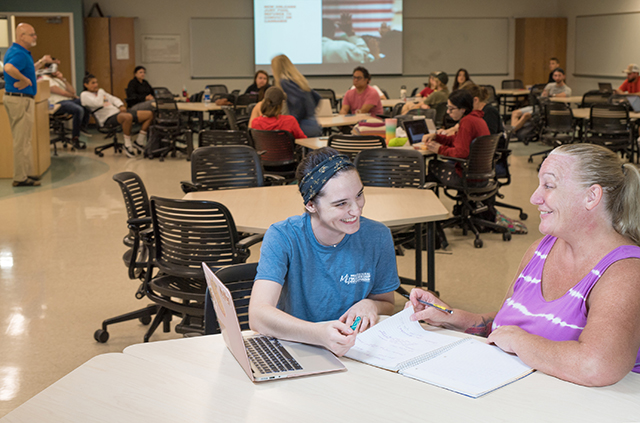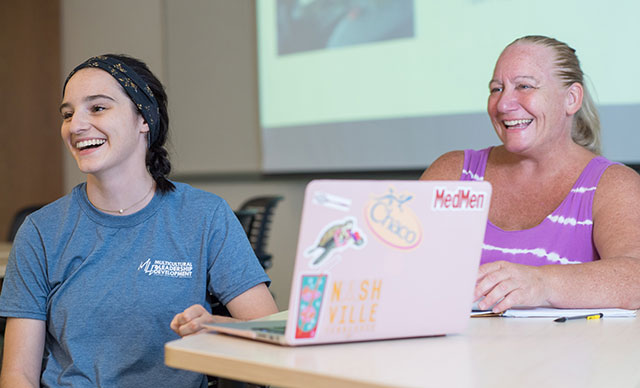If Christine Anderson and Skylar Allen complete their FGCU degrees in December 2020 as planned, it won’t be the first time the mother-daughter duo has graduated together.
Sound like the plot of a Hollywood comedy? It’s not. When Anderson was awarded an associate’s degree in accounting from a community college more than 20 years ago, she was eight months pregnant with Allen.
“I was in a cap and gown May 6, 1997, and I had her June 18,” says Anderson, 51, who, like her daughter, is quick with a quip.
After Allen, 22, started classes at FGCU in fall 2017, she encouraged her mother to follow her and upgrade her AA to a bachelor’s degree. This fall, they’ve even taken a couple of classes together — just like they did back in New Jersey when Anderson was counting down the days in her final semesters — and trimesters. They even share a major: integrated studies with a focus on cannabis studies.
“Yeah, I’m taking weed classes with my mom,” Allen deadpans.

Comic banter aside, there’s a serious, practical side to the story of why they both chose their field of study. Allen uses marijuana legally and medicinally because it relieves her symptoms from fibromyalgia, a disorder characterized by widespread pain, fatigue and cognitive difficulties. She’s had days when constant pain and lack of energy have kept her from getting out of bed let alone walking to classes. Anderson, meanwhile, decided to explore cannabis studies so she could better understand her daughter’s situation and offer help.
Allen’s condition, which was diagnosed about two years ago, has no cure and qualified her for medicinal marijuana use under Florida Department of Health rules.
“When I got the ID card, it was the happiest day of my life because I knew there was hope. There’s something that can help me live a functioning life,” says Allen, who started suffering seizures and chronic pain when she was 17. “It came down to a choice of taking opioids for the rest of my life or using cannabis. Cannabis is a non-addicting way to manage my pain and preserve my body. Everybody and every body is different, but it’s a good treatment plan for me.”
There’s some irony in her choice, which Allen appreciates. She readily admits to looking down on pot-smoking peers when she was younger. Now, weed provides relief that enables her to pursue a college degree — a dream she thought she’d never see come true because of her debilitating condition.
For some of her peers, that vision likely would turn into an eye-rolling exercise in extreme embarrassment if a parent decided to enroll in the same college and — OMG — take some of the same classes. (See Melissa McCarthy in “Life of the Party.”)
Not in this scenario. The real storyline: Daughter encourages mother to go back to school. Daughter sits next to mother willingly in weed culture class. Daughter and mother encourage each other to study harder, even compare GPAs.
“She asked me if I was going to be embarrassed to have her here,” Allen recalls. “I said, ‘Why would I be embarrassed? You’re finishing your degree. You’re being a good role model for your kid by finishing what you started.’ I don’t care if people know she’s my mom. No one has ever told me it’s weird — every single person has said ‘that’s so cool.’ “
“I wanted to make sure I wasn’t invading her space,” chimes in Anderson, who’s already prodding her own mother to make plans for a multigenerational graduation celebration a year from now. “I’ve always told my daughters to go to school. No matter how long it takes, no one can take your education away from you.”
Instructor Sam Walch, who teaches the cannabis class the pair has together, points out that Anderson isn’t the only older student in the course.

“Sometimes I’ve had a student bring a mom into class, but it’s unusual to have them as co-students — it’s wonderful,” he says. “We have a section on old cannabis vs. new cannabis, and it’s fun to have Christine as someone representing another generation’s perspective.”
Even though they’re now living together, too, after years of living independently, they are not completely inseparable. They’re taking the same “Foundations of Civic Engagement” class, but they’re working on separate projects. Anderson, whose previous credits qualified her to enroll as a junior at FGCU, draws a line at getting involved in student organizations alongside undergraduates her daughter’s age.
“Everybody’s been really awesome,” she says. “I did a project in a class last year, and I told the girl I was paired with, ‘I’m sorry you got stuck with me,’ but she said, ‘Are you kidding? I have the coolest partner.’”
Still, two decades between college programs presents some challenges for the early-retired bookkeeper, who does part-time substitute teaching. Even though she took continuing education courses while still working in a New Jersey welfare office, classroom culture has changed and study routines can be hard to readjust to. Anderson prefers hardcover textbooks to e-books, hand-writing notes in class and typing them later, following a printed syllabus rather than an online doc.
Then there’s the whole thing of catching up with current weed lingo. Anderson was never one to partake even when she was her daughter’s age, she says.
“I’ll ask her, ‘What does this mean?’ I’m kind of a little bit behind as far as that goes, but people have been pretty cool about it,” Anderson says. “The knowledge we’re getting here — I’m just blown away by it. Cannabis law is changing practically every day, but the professors do a good job of keeping us up to date. What I’m learning will help me help Skye in the future.”
With graduation in sight, Allen hopes to use her cannabis knowledge and personal experience to help others in similar situations, perhaps through nonprofit work. She described a negative experience she had at a local medical marijuana dispensary, where a staff member was less than knowledgeable or compassionate about assisting a client with health issues.
“Some people in this situation have never gone near weed — it’s their last option,” she says. “Having this misunderstood illness, it can be challenging to get people to listen to you. It’s important to me to take this knowledge and help other people.”
- Learn also about FGCU’s cannabis professional certificate